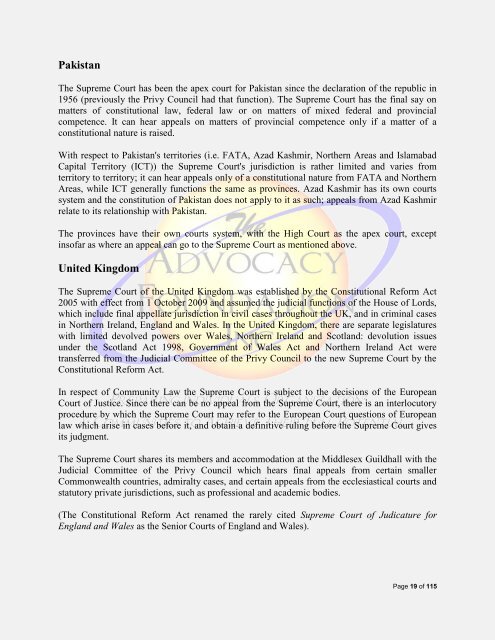Judicial ReEngineering
Judicial ReEngineering
Judicial ReEngineering
You also want an ePaper? Increase the reach of your titles
YUMPU automatically turns print PDFs into web optimized ePapers that Google loves.
Pakistan<br />
The Supreme Court has been the apex court for Pakistan since the declaration of the republic in<br />
1956 (previously the Privy Council had that function). The Supreme Court has the final say on<br />
matters of constitutional law, federal law or on matters of mixed federal and provincial<br />
competence. It can hear appeals on matters of provincial competence only if a matter of a<br />
constitutional nature is raised.<br />
With respect to Pakistan's territories (i.e. FATA, Azad Kashmir, Northern Areas and Islamabad<br />
Capital Territory (ICT)) the Supreme Court's jurisdiction is rather limited and varies from<br />
territory to territory; it can hear appeals only of a constitutional nature from FATA and Northern<br />
Areas, while ICT generally functions the same as provinces. Azad Kashmir has its own courts<br />
system and the constitution of Pakistan does not apply to it as such; appeals from Azad Kashmir<br />
relate to its relationship with Pakistan.<br />
The provinces have their own courts system, with the High Court as the apex court, except<br />
insofar as where an appeal can go to the Supreme Court as mentioned above.<br />
United Kingdom<br />
The Supreme Court of the United Kingdom was established by the Constitutional Reform Act<br />
2005 with effect from 1 October 2009 and assumed the judicial functions of the House of Lords,<br />
which include final appellate jurisdiction in civil cases throughout the UK, and in criminal cases<br />
in Northern Ireland, England and Wales. In the United Kingdom, there are separate legislatures<br />
with limited devolved powers over Wales, Northern Ireland and Scotland: devolution issues<br />
under the Scotland Act 1998, Government of Wales Act and Northern Ireland Act were<br />
transferred from the <strong>Judicial</strong> Committee of the Privy Council to the new Supreme Court by the<br />
Constitutional Reform Act.<br />
In respect of Community Law the Supreme Court is subject to the decisions of the European<br />
Court of Justice. Since there can be no appeal from the Supreme Court, there is an interlocutory<br />
procedure by which the Supreme Court may refer to the European Court questions of European<br />
law which arise in cases before it, and obtain a definitive ruling before the Supreme Court gives<br />
its judgment.<br />
The Supreme Court shares its members and accommodation at the Middlesex Guildhall with the<br />
<strong>Judicial</strong> Committee of the Privy Council which hears final appeals from certain smaller<br />
Commonwealth countries, admiralty cases, and certain appeals from the ecclesiastical courts and<br />
statutory private jurisdictions, such as professional and academic bodies.<br />
(The Constitutional Reform Act renamed the rarely cited Supreme Court of Judicature for<br />
England and Wales as the Senior Courts of England and Wales).<br />
Page 19 of 115

















